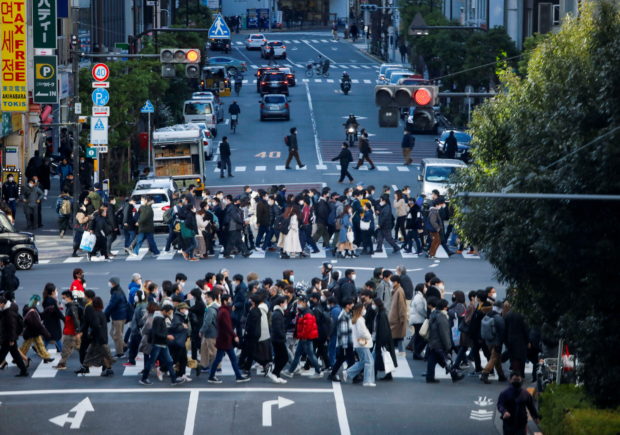
Passersby wearing protective face masks walk on the street, amid the coronavirus disease (COVID-19) pandemic, in Tokyo, Japan January 15, 2022. REUTERS
TOKYO — The Japanese government has announced new measures concerning outpatient care for people infected with the novel coronavirus, including allowing doctors to diagnose close contacts as infected without conducting a PCR test at a medical facility if the contact has a fever or other symptoms.
The measures will be taken in response to the rapid spread of the Omicron variant. The government will also allow local governments to review outpatient care at their own discretion in the future.
Health, Labor and Welfare Minister Shigeyuki Goto told reporters on Monday: “The government’s policy is based on the opinions of experts and others. It allows local governments to make their own decisions.”
If there is a rapid increase in the number of patients and it therefore takes a long time to be seen by a doctor, a patient who has symptoms but is at low risk of developing serious problems will be able to see a doctor after first checking on their own using a simple antigen test kit.
Medical institutions will also be encouraged to increase their use of remote medical services, for example over the phone and online. If someone gets a positive result from a self-test, a doctor will be allowed to make a definitive diagnosis without retesting them at a medical facility.
To reduce the burden on medical institutions, doctors will be also allowed to diagnose a close contact as an infected person without testing at a medical facility, if the close contact — such as a family member of the infected person — has a fever or other symptoms.
If outpatient services are too overloaded to see someone, people who have mild symptoms but are at low risk of developing serious problems can test themselves without visiting a medical institution and then contact local government’s health follow-up centers. The centers have doctors on standby, and people can have their health monitored during home recuperation.
Infection test kits are becoming difficult to obtain. Prime Minister Fumiko Kishida told reporters Monday that the government has asked manufacturers to increase the supply to 800,000 tests per day under a purchase guarantee agreement.
Kishida also referred to his intention to promote remote medical care, saying, “We will make further improvements to ensure smooth outpatient visits.â€